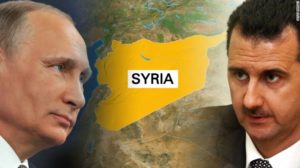by WorldTribune Staff, December 29, 2016
Syria would be divided into zones of regional power and President Bashar Assad would be allowed to remain in control under a “compromise” agreement worked out by Russia, Turkey and Iran.
Under the deal, the new federal structure in Syria would be controlled by Assad’s Alawite sect.

Assad’s powers would be diminished, but he would be allowed to say until the next presidential election when “he would quit in favor of a less-polarizing Alawite candidate,” according to Andrey Kortunov, director general of the Russian International Affairs Council, a think tank close to the Russian Foreign Ministry.
“There has been a move toward a compromise,” Kortunov said. “A final deal will be hard, but stances have shifted.”
Assad would eventually be forced out, but in a face-saving way, with guarantees for him and his family, Kortunov added.
“A couple of names in the leadership have been mentioned (as potential successors),” said Kortunov, declining to name names.
Foreign and defense ministers from Russia, Turkey and Iran met in Moscow on Dec. 20 to discuss the principles of the deal. Russia has called for a new round of peace talks between the Syrian government and the opposition in mid-January in Astana, the capital of Kazakhstan.
The talks would not initially involve the United States, which has irritated some in Washington.
“So this country that essentially has an economy the size of Spain, that’s Russia, is strutting around and acting like they know what they are doing,” said one U.S. official, who declined to be named because of the subject’s sensitivity. “I don’t think the Turks and the Russians can do this (political negotiations) without us.”
Analysts say President Vladimir Putin is taking the lead in Syria negotiations and is intent on extending Russia’s increasing power in the Middle East and regaining its mantle as a world superpower.
“It’s a very big prize for them if they can show they’re out there in front changing the world,” Sir Tony Brenton, Britain’s former ambassador to Moscow, told Reuters. “We’ve all grown used to the United States doing that and had rather forgotten that Russia used to play at the same level”
Russian sources say the Syria peace deal would begin with a nationwide ceasefire, followed by a new round of talks. The Gulf states would then get involved in the process, then the United States, and at a later stage the European Union which would be asked, maybe with the Gulf states, to pick up the bill for rebuilding.
Putin has struck a series of backroom understandings with Turkish President Recep Tayyip Erdogan in order to move the deal forward, several sources familiar with the process say.
Moscow convinced Iran to buy into the idea of a three-way peace deal by getting Turkey to drop its demands for Assad to go soon, the same sources said.
“Our priority is not to see Assad go, but for terrorism to be defeated,” one senior Turkish government official, who declined to be named, said. “It doesn’t mean we approve of Assad. But we have come to an understanding. When Islamic State is wiped out, Russia may support Turkey in Syria finishing off the PKK.”
Aydin Sezer, head of the Turkey and Russia Center of Studies, an Ankara-based think tank, said Turkey had now “completely given up the issue of regime change” in Syria.
Brenton, Britain’s former ambassador, said Moscow and Ankara had done a deal because Moscow had needed Turkey to get the opposition out of Aleppo and to come to the negotiating table.
“The real flesh in the game the Turks have, and the fear they have, is of an autonomous Kurdistan emerging inside Syria that would have direct implications for them,” he said.
Meanwhile, Iranian Defense Minister Hossein Dehghan said on Dec. 27 that Saudi Arabia should not participate in the Syrian peace process.
“They [Saudi Arabia] are seeking to topple the existing regime. No talks should be allowed with those who are eager to do it. We must give them a decisive answer,” Dehghan said in an interview with RT television.
